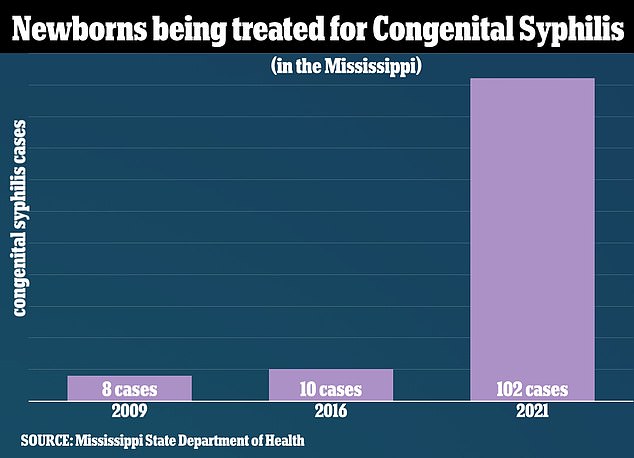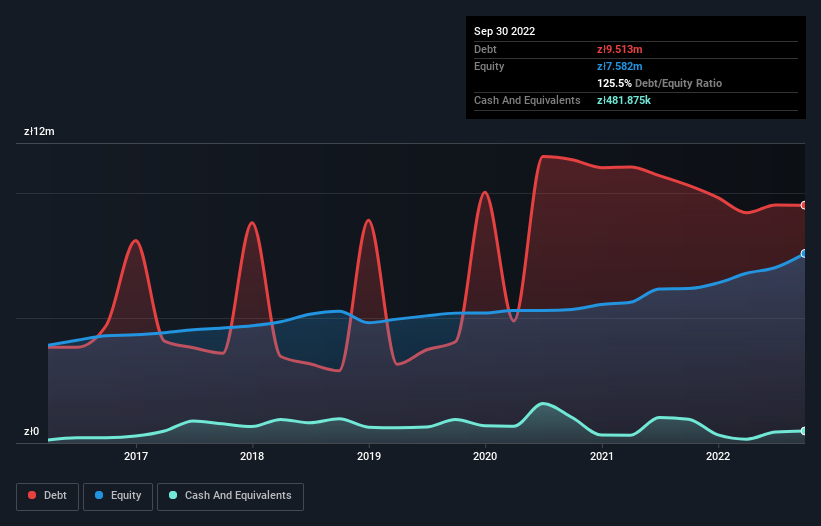The number of babies being diagnosed with congenital syphilis in Mississippi has skyrocketed more than 900 percent over a five year span, according to a new study.
Dr. Thomas Dobbs, the medical director of the Mississippi State Department of Health’s Crossroads Clinic in Jackson, found that a whopping 102 newborns were treated for the sexually-transmitted infection in 2021, up from just 10 in 2016.
Babies born with the disease can face organ damage, problems with their nervous system and potentially blindness or deafness. At least one baby has died from the disease, according to Mississippi state officials, though the State Department of Health does not formally track congenital syphilis deaths.
Dobbs told NBC News he has spoken with other health care providers, all of whom ‘are absolutely horrified’ that babies are being born with the disease as they call for further investments in women’s health.
‘This seems like something that should have happened a hundred years ago, not last year,’ he said. ‘There’s really kind of a shock.’


Dr. Thomas Dobbs shared data showing that the number of syphilis cases among newborns in Mississippi skyrocketed nearly 1000 percent
Syphilis cases have been increasing across Mississippi, the nation’s poorest state, over the past two decades as neonatal facilities shutter their doors in some of the poorest communities.
In 2000, there were 14 congenital syphilis cases, with 10 reported the following year, according to previously-released data from the Mississippi State Department of Health.
From there though, the number of cases started to plummet — with zero cases reported in 2005 and 2006.
By 2009, there were eight cases of congenital syphilis, and by 2016, there were 10.
But the numbers started ticking up again in 2019, and seemed to get worse during the global pandemic, breaking a record in 2021 with over 100 reported cases, according to data Dobbs shared with NBC News, based on hospital billing information.
At the same time, preliminary data from the Centers for Disease Control and Prevention shows that syphilis cases across the United States more than doubled from 941 in 2017 to at least 2,677 in 2021.
The Mississippi Department of Health has not yet released its final 2021 numbers, which are based on clinicians reporting cases directly to the state.
But in 2020, the department found that black newborns accounted for 70 percent of the state’s congenital syphilis cases, despite making up only about 42 percent of the state’s live births that year.
Dr. Paul Byers, the state’s epidemiologist, says he expects similar results in the final 2021 report.
DailyMail.com has reached out for comment.

Dobbs, who previously served as the state’s health officer, said health care providers ‘are absolutely horrified’ that babies are being born with the disease

Congenital syphilis occurs when a pregnant mother passes syphilis onto their child
Symptoms of congenital syphilis
Symptoms of congenital syphilis may include:
Deformed bonesSevere anemiaEnlarged liver or spleenJaundice (yellowing of the skin or eyes)Brain and nerve damage, like blindness or deafnessMeningitisSkin rashesDeath
Source: Centers for Disease Control
Dr. Anita Henderson, a Hattiesburg-based pediatrician, also said she has treated more babies with congenital syphilis in the past three to four years than she has in all of her 25-year career.
‘I don’t think many people know there is the potential for babies to die from congenital syphilis,’ she said.
Congenital syphilis occurs when the sexually-transmitted infection is passed from a mother to their child when she is pregnant.
Women with syphilis can undergo a series of penicillin shots at least one month before giving birth to prevent passing the disease onto their child.
If left untreated, a pregnant woman with syphilis has an 80 percent chance of passing it on to her baby. In around 40 percent of cases, Dobbs said, those pregnancies will end with miscarriages.
When babies are born with syphilis, they must usually remain in the hospital for two weeks after birth as penicillin is delivered intravenously.
Newborns with the disease may not initially show symptoms, experts say, but those who are not treated can face serious health complications or death if they are not treated within three months after birth.

Newborns with syphilis who are not treated within three months of their birth can face serious complications and even death

When babies are born with syphilis, they must usually remain in the hospital for two weeks after birth as penicillin is delivered intravenously
But in Mississippi, some counties lack an obstetrician, forcing pregnant women to travel for care on often unreliable public transportation — sometimes having to forego work for the day to do so.
Many also have to wait weeks before their first prenatal visit, and last year, it took about a month on average to be approved for a public health insurance program though Medicaid that covers pregnancies.
Mississippi is one of the poorest states in America, ranking at 37 out of 50 in terms of its gross domestic product according to the Bureau of Economic Analyses. It ranks 17th for its death rate from drug overdose, figures from the CDC show.
Making matters worse, the Department of Health announced in 2016 that it was closing nine county health departments.
And just last year, the Mississippi Delta — which has some of the nation’s highest poverty rates and has long faced diminished access to maternal and infant care — saw its last remaining neonatal ICU close while the Greenwood Leflore Hospital shuttered its labor and delivery ward.
‘In a rural state like Mississippi, we’re going to have to look at where are the pockets of disease and how can we reach those mothers,’ Henderson said, ‘but I also think our state really has got to look at investing in pregnant women, investing in their health.’

Dr. Paul Byers, the state’s epidemiologist, said officials are now considering a screening mandate for pregnant women
Nina Ragunanthan, an OBGYN, said that in the past year alone she had two patients test positive for syphilis.
One of the women received scarce prenatal care, she said, while the other tested negative throughout her pregnancy only to test positive at the delivery.
‘I think it’s completely attainable to lower these rates,’ she said. ‘It’s not something where it’s esoteric. It’s kind of straight forward, but it is just sometimes the logistial challenges.’
She noted that getting patients in early and making sure their partners receive treatment ‘takes money.’
At the Delta Health Center, where patients are seen regardless of their insurance or ability to pay, Ragunanthan tests pregnant patients for syphilis during their prenatal visit, then again in their third trimester wand when they show up in labor.
Her husband, Dr. Braveen Ragunanthan, a pediatrician, then follows CDC guidelines when dealing with babies diagnosed with syphilis: conducting X-rays to see if any bones are deformed, performing lumbar puncture tests to screen their cerebrospinal fluid and starting them on IV penicillin.
But Mississippi does not require prenatal screenings, and as of 2016, it was one of only six states without a law requiring syphilis screenings.
Now, Byers said the Department of Health is exploring the possibility of a testing mandate.

The above map shows cases of chlamydia per 100,000 people across the 50 states of the U.S. and territories. It reveals that Mississippi has the highest case count for the sexually transmitted disease out of all states
Mississippi has previously been named the United States’ gonorrhea and chlamydia capital.
It earned the title in 2020, with the biggest gonorrhea outbreak in the country for five years running. It also detected about one case of chlamydia for every 124 people, and one case of syphilis per every 1,390 residents.
Speaking to DailyMail.com last year, Byers said STD rates were high in the state due to a myriad of factors.
‘High rates in Mississippi are impact by a number of factors including social determinants of health and inadequate access to care, negative impacts on health in communities with high social vulnerability, lack of health care coverage, which may contribute to a delay in seeking care, increases in drug use, and social stigmatization of being diagnosed with an STD,’ he said.
‘Some increases may certainly have been due to the interruption in routine healthcare access over the last two years.’
Byers said more healthcare specialists trained in STDs were being recruited by the state to help limit infections, and that education programs was being expanded.
‘STDs are not a benign disease, we are seeing impacts with increased cases of congenital syphilis, unrecognized and untreated chlamydia can lead to infertility, certain STIs, including syphilis, can increase the risk of HIV,’ he added.
‘Our message is: Be protected, get tested, get treated and let your contacts know if you have been diagnosed with an STD.’
Discovered on: 2023-02-12 18:32:35
Source: Mississippi hit with a 900% rise in the number of newborn babies being trea…


